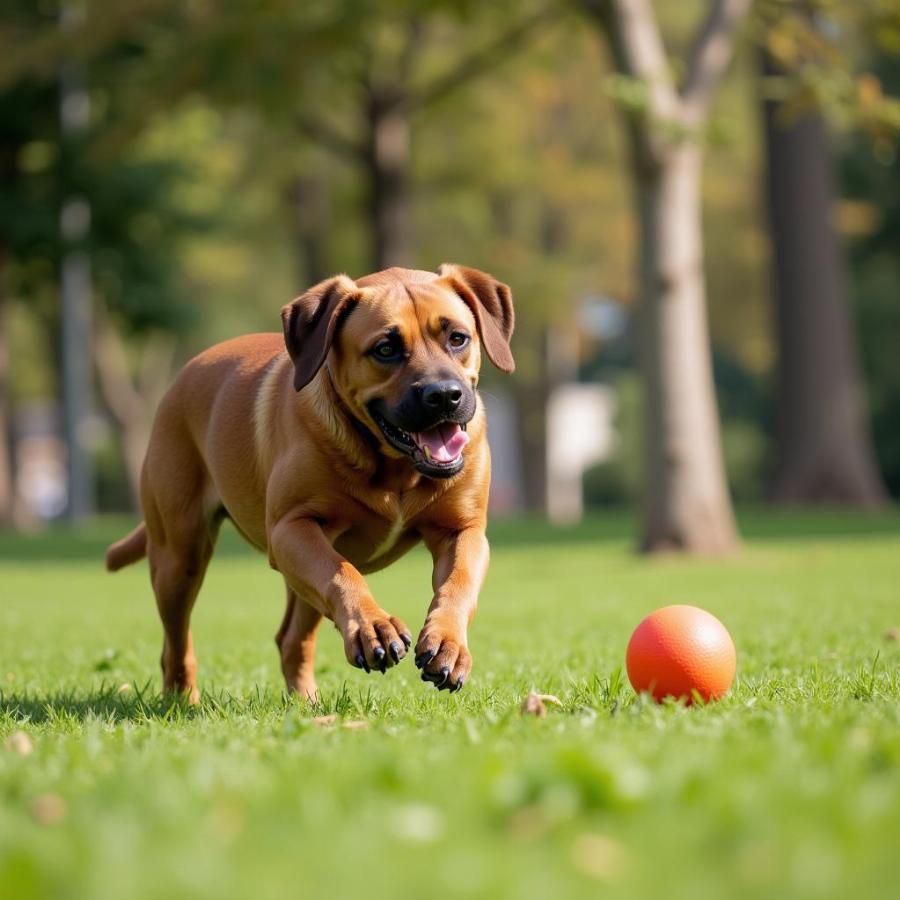The pit mastiff dog is a popular mixed breed known for its loyalty, intelligence, and strength. This hybrid breed, typically a cross between an American pit bull terrier and a mastiff, inherits desirable traits from both parent breeds, making it an excellent companion for the right owner. If you’re considering welcoming a pit mastiff into your life, it’s crucial to understand their temperament, care requirements, and potential challenges.
Origin and History of the Pit Mastiff
While the exact origin of the pit mastiff remains unclear, this hybrid breed likely emerged in the United States in recent decades. The goal of crossing pit bulls with mastiffs was often to combine the loyalty and trainability of the pit bull with the size and guarding instincts of the mastiff. As with many mixed breeds, pit mastiffs don’t have a documented history or standardized breeding practices like their purebred counterparts.
Physical Characteristics: A Blend of Power and Agility
Pit mastiffs are generally large dogs with a powerful build. Their weight can vary significantly depending on the specific mastiff breed in the mix, typically ranging from 60 to 120 pounds or more. They have a short, dense coat that can come in a variety of colors, including brindle, fawn, black, and brown. Their head is broad, with a short muzzle and strong jaws. Despite their size, pit mastiffs are often surprisingly agile and athletic.
Temperament and Personality: Loyal Companions with High Energy
Known for their loyalty and affectionate nature, pit mastiffs thrive on human companionship and form strong bonds with their families. They are intelligent dogs that are eager to please, making them highly trainable with proper socialization and positive reinforcement techniques.
 Pit Mastiff Playing Fetch
Pit Mastiff Playing Fetch
It’s important to remember that pit mastiffs, like all dogs, are individuals. Their temperament can be influenced by genetics, upbringing, and socialization. Early socialization and consistent training are crucial for a well-adjusted and happy pit mastiff.
Training and Exercise Needs: A Commitment to an Active Lifestyle
Pit mastiffs possess significant energy levels inherited from both parent breeds. They require a substantial amount of daily exercise, ideally at least an hour of vigorous activity, such as running, playing fetch, or participating in canine sports. Mental stimulation is equally important to prevent boredom and potential behavioral issues. Puzzle toys, obedience training sessions, and interactive games can help keep their minds engaged.
“Providing adequate mental and physical stimulation is essential for a happy and well-behaved pit mastiff. Their intelligence and eagerness to please make them highly trainable,” says renowned dog trainer, Sarah Williams.
Health Considerations: Potential Issues and Preventative Care
While generally healthy, pit mastiffs can be prone to certain health conditions common to both pit bulls and mastiffs, including:
- Hip and Elbow Dysplasia: These conditions affect the joints and can cause pain and mobility issues.
- Bloat: A life-threatening condition that can occur in large-breed dogs, particularly those with deep chests.
- Skin Allergies: Pit mastiffs can be susceptible to allergies, leading to itching, scratching, and skin infections.
Regular veterinary checkups, vaccinations, and parasite prevention are essential for maintaining your pit mastiff’s health.
Is a Pit Mastiff Right for You?
Pit mastiffs can make loving and devoted companions for the right owners. However, potential owners should consider the following factors:
- Experience with Large Breeds: Their size and strength require an owner who can handle them confidently.
- Time Commitment: Pit mastiffs need a lot of attention, exercise, and training.
- Lifestyle: An active household with plenty of space is ideal.
- Local Regulations: Some areas have breed-specific legislation that may restrict pit mastiff ownership.
Conclusion: A Rewarding Companion for Responsible Owners
Owning a pit mastiff can be an incredibly rewarding experience for those prepared for the commitment. With proper training, socialization, and care, these loyal and intelligent dogs can bring joy and companionship for many years. Remember to research the breed thoroughly and choose a reputable breeder if you decide that a pit mastiff is the right fit for your family.
FAQs about Pit Mastiff Dogs:
1. Are pit mastiffs good with children?
With proper socialization and supervision, pit mastiffs can be good with children. However, early training and teaching children how to interact with dogs respectfully are crucial.
2. Are pit mastiffs aggressive?
Like any breed, pit mastiffs can exhibit aggression if not properly trained and socialized. Their temperament is influenced by genetics and environment.
3. How much exercise does a pit mastiff need?
Pit mastiffs are high-energy dogs that require at least an hour of vigorous exercise daily.
4. What is the lifespan of a pit mastiff?
The average lifespan of a pit mastiff is typically between 8 to 12 years.
5. Are pit mastiffs easy to train?
Pit mastiffs are intelligent dogs that are eager to please, making them relatively easy to train with positive reinforcement techniques.
Explore More About Dog Breeds:
Interested in learning about other fascinating dog breeds? Check out our articles on pitbull mastiff dog and dogs that start with m. For those intrigued by unique and protective breeds, don’t miss our piece on guardian lion dogs.
Unleashing the Beauty of Dog Ownership with Beaut Dogs
Beaut Dogs is your ultimate destination for all things dog-related. We’re passionate about providing valuable insights, expert advice, and a supportive community for dog lovers worldwide. From breed guides to training tips, we cover every aspect of responsible dog ownership. For personalized guidance and support, reach out to our team at [email protected]. Let’s embark on this incredible journey together.